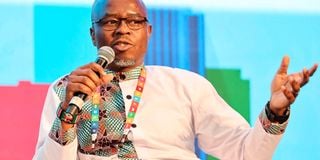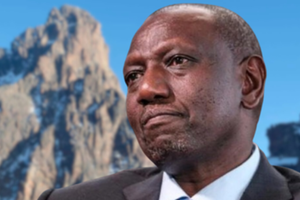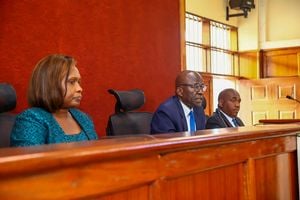Joe Ageyo: Media’s role in enhancing governance for a just and equitable society

Nation Media Group Editor-in-Chief Joe Ageyo addressing participants during the Africa Shared Value and ESG Summit at Radisson Blu Hotel in Nairobi on October 25, 2024.
As the media faces increasing scrutiny globally, particularly from governments, it continues to play a crucial role in promoting good governance and accountability.
While some African heads of state have openly criticised the media’s coverage of government performance, the media’s role as a public watchdog remains pivotal.
Speaking at this year’s Shared Value Africa Summit in Nairobi, Joe Ageyo, Editor-in-Chief of the Nation Media Group (NMG) PLC, defended the media’s role, clarifying that it should not be mistaken for opposition to governments.
Rather, he emphasised, it is a platform to hold those in power accountable.
In a panel discussion on “Creating a Just and Equitable Society”, Mr Ageyo explained that the media serves as a conduit of information that the public needs to access.
“Media is about information, and information is at the center of everything,” he said.
The two-day workshop, which brought together corporate leaders and governance experts, focused on aligning the principles of Shared Value with Environmental, Social, and Governance (ESG) values.
By facilitating public access to information, Mr Ageyo noted, the media enables other fundamental rights, empowering citizens to actively participate in governance.
“We inform the public about what is happening and what is not. Through this, we improve governance and foster a more just and equitable society,” he said.
“When people are informed, they can engage in meaningful conversations, whether on politics, economics, health, or climate change. Media sets the national agenda, which includes advancing Kenya’s and the world’s Sustainable Development Goals (SDGs),” Mr Ageyo added.
He underscored that a well-informed public is fundamental to a society that values justice and equity, reminding leaders that accountability is essential to lasting progress.
The recent nationwide protests in Kenya over the Finance Bill 2024 illustrated the media's powerful influence.
With the younger generation, Gen Zs, voicing their opposition, the media’s role in amplifying the public’s concerns was highlighted.
Although the Parliament initially passed the Bill, President William Ruto later withdrew it, partly due to public pressure, which the media captured extensively.
While some officials criticised the media’s coverage, others lauded it for sparking crucial conversations around governance.
During the summit, Bernard Kiragu, Managing Partner at Scribe Service Kenya, commended the media’s impact on shaping the public’s discourse on governance across Kenya and the continent.
“Everything is clear after recent events. For a just and equitable society, we must continue pushing for accountability,” Kiragu said, referencing the Gen Z-led protests as a learning moment in the demand for transparency and fair governance.
Mr Kiragu noted that Kenya has sound policies and a robust constitution, yet implementation remains a challenge.
He stressed that persistent media engagement is vital in bridging this gap, as it continually reminds leaders of their obligations to the public.
In addition to the media, other societal institutions have roles to play.
Tiekie Barnard, Founder and CEO of Shared Value Africa, highlighted the need for religious leaders to uphold ethical standards.
Expressing regret that some religious leaders have strayed from their moral responsibilities, she urged them to reclaim their role in advancing social values.
“Too many places of worship are now more commercial than community-centered,” she observed, urging religious institutions to reinforce their commitment to societal values and governance.
The summit, hosted by Shift Impact Africa in partnership with the Shared Value Africa Initiative (SVAI) and the ESG Africa Conference, aimed to bridge discussions between corporate governance and societal welfare.
The discussions highlighted how the media, as part of civil society, encourages transparency, accountability, and ethical governance, key elements in achieving a just and equitable society.
While the media may face criticism, its role in a democratic society remains essential.





